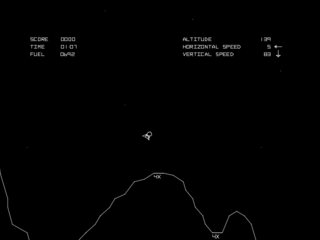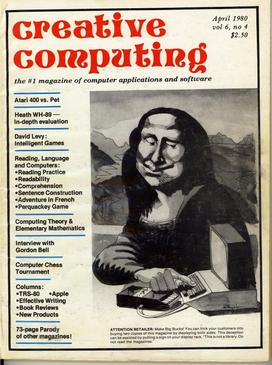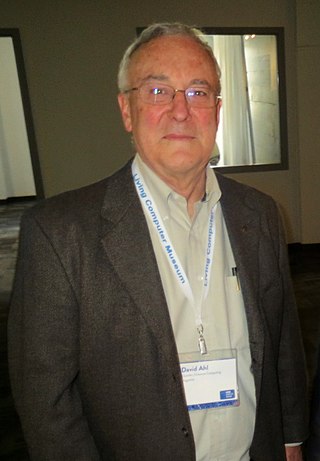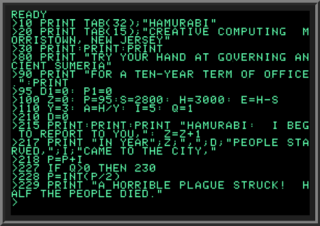
BASIC is a family of general-purpose, high-level programming languages designed for ease of use. The original version was created by John G. Kemeny and Thomas E. Kurtz at Dartmouth College in 1963. They wanted to enable students in non-scientific fields to use computers. At the time, nearly all computers required writing custom software, which only scientists and mathematicians tended to learn.

GW-BASIC is a dialect of the BASIC programming language developed by Microsoft from IBM BASICA. Functionally identical to BASICA, its BASIC interpreter is a fully self-contained executable and does not need the Cassette BASIC ROM found in the original IBM PC. It was bundled with MS-DOS operating systems on IBM PC compatibles by Microsoft.

A minicomputer, or colloquially mini, is a type of smaller general-purpose computer developed in the mid-1960s and sold at a much lower price than mainframe and mid-size computers from IBM and its direct competitors. In a 1970 survey, The New York Times suggested a consensus definition of a minicomputer as a machine costing less than US$25,000, with an input-output device such as a teleprinter and at least four thousand words of memory, that is capable of running programs in a higher level language, such as Fortran or BASIC.
BBC BASIC is an interpreted version of the BASIC programming language. It was developed by Acorn Computers Ltd when they were selected by the BBC to supply the computer for their BBC Literacy Project in 1981.
Tiny BASIC is a family of dialects of the BASIC programming language that can fit into 4 or fewer KBs of memory. Tiny BASIC was designed by Dennis Allison and the People's Computer Company (PCC) in response to the open letter published by Bill Gates complaining about users pirating Altair BASIC, which sold for $150. Tiny BASIC was intended to be a completely free version of BASIC that would run on the same early microcomputers.
Microsoft BASIC is the foundation software product of the Microsoft company and evolved into a line of BASIC interpreters and compiler(s) adapted for many different microcomputers. It first appeared in 1975 as Altair BASIC, which was the first version of BASIC published by Microsoft as well as the first high-level programming language available for the Altair 8800 microcomputer.

Lunar Lander is a genre of video games loosely based on the 1969 landing of the Apollo Lunar Module on the Moon. In Lunar Lander games, players control a spacecraft as it falls toward the surface of the Moon or other astronomical body, using thrusters to slow the ship's descent and control its horizontal motion to reach a safe landing area. Crashing into obstacles, hitting the surface at too high a velocity, or running out of fuel all result in failure. In some games in the genre, the ship's orientation must be adjusted as well as its horizontal and vertical velocities.
In computing, CLS is a command used by the command-line interpreters COMMAND.COM and cmd.exe on DOS, Digital Research FlexOS, IBM OS/2, Microsoft Windows and ReactOS operating systems to clear the screen or console window of commands and any output generated by them. It does not clear the user's history of commands, however. The command is also available in the DEC RT-11 operating system, in the open-source MS-DOS emulator DOSBox and in the EFI shell. In other environments, such as Linux and Unix, the same functionality is provided by the clear command.

Star Trek is a text-based strategy video game based on the Star Trek television series (1966–69) and originally released in 1971. In the game, the player commands the USS Enterprise on a mission to hunt down and destroy an invading fleet of Klingon warships. The player travels through the 64 quadrants of the galaxy to attack enemy ships with phasers and photon torpedoes in turn-based battles and refuel at starbases. The goal is to eliminate all enemies within a random time limit.

A type-in program or type-in listing was computer source code printed in a home computer magazine or book. It was meant to be entered via the keyboard by the reader and then saved to cassette tape or floppy disk. The result was a usable game, utility, or application program.

Turbo-BASIC XL is an advanced version of the BASIC programming language for the Atari 8-bit family of home computers. It is a compatible superset of the Atari BASIC that shipped with the Atari 8-bit systems. Turbo-Basic XL was developed by Frank Ostrowski and published in the December 1985 issue of German computer magazine Happy Computer. A version for the 400/800 models was released shortly after as Frost Basic 1.4. Several modified versions working with different DOS systems have been released by other authors.

Creative Computing was one of the earliest magazines covering the microcomputer revolution. Published from October 1974 until December 1985, the magazine covered the spectrum of hobbyist/home/personal computing in a more accessible format than the rather technically oriented Byte.

Hamurabi is a text-based strategy video game of land and resource management. It was first developed under the name King of Sumeria or The Sumer Game by Doug Dyment in 1968 at Digital Equipment Corporation as a computer game for fellow employee Richard Merrill's newly invented FOCAL programming language.

David H. Ahl is an American author who is the founder of Creative Computing magazine. He is also the author of many how-to books, including BASIC Computer Games, the first computer book to sell more than a million copies.

The history of the personal computer as a mass-market consumer electronic device began with the microcomputer revolution of the 1970s. A personal computer is one intended for interactive individual use, as opposed to a mainframe computer where the end user's requests are filtered through operating staff, or a time-sharing system in which one large processor is shared by many individuals. After the development of the microprocessor, individual personal computers were low enough in cost that they eventually became affordable consumer goods. Early personal computers – generally called microcomputers – were sold often in electronic kit form and in limited numbers, and were of interest mostly to hobbyists and technicians.
Mainframe computers are computers used primarily by businesses and academic institutions for large-scale processes. Before personal computers, first termed microcomputers, became widely available to the general public in the 1970s, the computing industry was composed of mainframe computers and the relatively smaller and cheaper minicomputer variant. During the mid to late 1960s, many early video games were programmed on these computers. Developed prior to the rise of the commercial video game industry in the early 1970s, these early mainframe games were generally written by students or employees at large corporations in a machine or assembly language that could only be understood by the specific machine or computer type they were developed on. While many of these games were lost as older computers were discontinued, some of them were ported to high-level computer languages like BASIC, had expanded versions later released for personal computers, or were recreated for bulletin board systems years later, thus influencing future games and developers.

The Sumerian Game is an early text-based strategy video game of land and resource management. It was developed as part of a joint research project between the Board of Cooperative Educational Services of Westchester County, New York and IBM in 1964–1966 for investigation of the use of computer-based simulations in schools. It was designed by Mabel Addis, then a fourth-grade teacher, and programmed by William McKay for the IBM 7090 time-shared mainframe computer. The first version of the game was played by a group of 30 sixth-grade students in 1964, and a revised version featuring refocused gameplay and added narrative and audiovisual elements was played by a second group of students in 1966.

A BASIC interpreter is an interpreter that enables users to enter and run programs in the BASIC language and was, for the first part of the microcomputer era, the default application that computers would launch. Users were expected to use the BASIC interpreter to type in programs or to load programs from storage.
BASIC-8, is a BASIC programming language for the Digital Equipment (DEC) PDP-8 series minicomputers. It was the first BASIC dialect released by the company, and its success led DEC to produce new BASICs for its future machines, notably BASIC-PLUS for the PDP-11 series. DEC's adoption of BASIC cemented the use of the language as the standard educational and utility programming language of its era, which combined with its small system requirements, made BASIC the major language during the launch of microcomputers in the mid-1970s.













